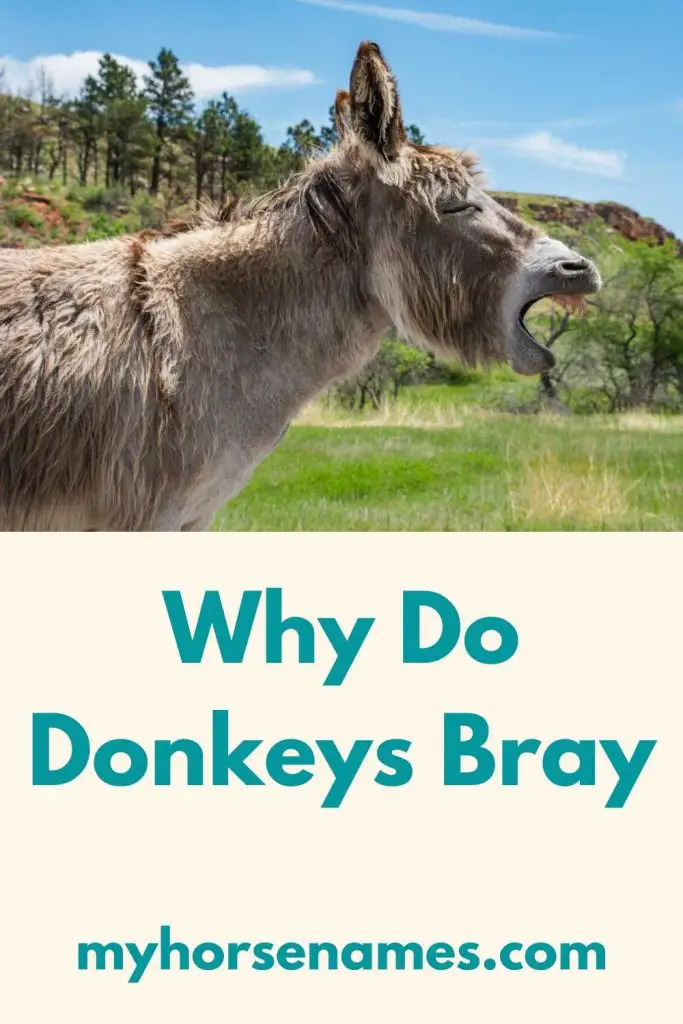Donkey’s bray is a unique sound produced by air intake and outflow. This vocalization makes a unique sound with little variation, but no one loves donkey braying daily on the farm or at home. Every animal uses his sound to communicate with the owner or other fellow.
“Unique sound has a unique message,” and that is the variation you can feel in donkey’s sound. Donkeys are social animals and have been communicating with humans for decades.
Donkeys are domesticated animals from the equine family. They are used as working animals for approximately 5000 years. There are almost 40 million donkeys globally, mostly in Asia and underdeveloped countries, for drought purposes.
In the family, male donkeys are known as jack and female jenny. Their baby is the same as the foal of horses.No one even considers their body appearance, behaviour and sounds. Even this unique hee haw is ignored.
Why do donkeys bray
Donkeys bray to communicate with each other Communication is not a single reason; alarming situations, stress, hunger and loneliness can also be reasons. Donkeys make hee-haw, which is the intake and outflow of air. Here how it sounds
Air intake – The hee
Air outflow – The haw
Their sound can vary in frequency. But an increase in sound represents their aggressive need. I had a donkey back in 2014, and he often brays when alone or calling a female donkey. Anti Caption for food can be another reason (they have a reliable clock in stomachs).he also responded to threat like a snake or other predator.
The research behind donkeys bray
Research made on “Vocalization of Equus asinus” to under vocalization of farm animals. They extracted the primary reason that it is intake and outflow of air from the mouth.
According to research, hee-haw is mostly produced by the male, and that sound appears when an animal becomes short of breath. Duration, acoustic character, and sequence is unique to every animal.
Donkeys’ vocal behaviour matches with Perissodactyls (zebras and horses) than cows and goats.
Reasons behind donkey bray
As earlier mentioned, there is no specific reason behind donkeys bray, but a combination of factors makes this unique sound. This hee haw is maybe fun to listen to but communication, loneliness: sexual attraction alarming conditions or unknown reasons attached behind it.
Communication with other animals
Every animal communicates with others like a dog’s bark is special affection toward the fellow dog. Cow’s moo or lowing is a hunger sound. Did you ever notice, the donkey started to bray after watching other donkeys.
They show their love and affection for them. Among all animals, donkeys attract towards their fellow animals, sounds hee-haw, keep their heads, and share food with them.
This communication is not limited to donkeys only. Donkeys can bray after watching their owner or other animals. Variation in their sound represents their mood and behaviour.
Stress
In Asian countries, donkeys are not fed on time and used for a draught. Donkey is familiar with harsh conditions, but sometimes stress causes to bray. Body injuries, accidents or illness cause him to bray. A good horse owner should know the difference between braying and crying.
Alarm condition
Sometimes donkeys bray to alarm the owner. Variation in vocalization and difference from regular days braying is the reason for threat. Donkeys are very alarming to emergency conditions.
Due to their loud and distinctive sound, they are used as a guard animals. They bond with stock and become aggressive if they feel any threat. They remain very alert during bray and make vocalization to alert their owners. You can train your donkey for braying to protect stock.
How to stop donkeys from braying
Donkeys are not limited to draught or guard purposes, but they make cute pets. Most of the donkey owners do not like donkeys braying at home. Braying at night or disturbing in routine is not good.YOU should train your donkey at the right time.
Donkeys make louder sounds in loneliness to call their friends while in captivity; they miss this primary reason to bray. Some donkeys are more vocal than others, so delaying their bray time or making contact can limit their vocalization.
A consistent feeding schedule can also limit donkeys bray. They need food at the proper time; otherwise, they will alarm you. Make a proper schedule and feed every day on time. Add some treats in their feed as donkeys love apples, carrots and watermelon.
Installing motion sensor lights can also reduce this vocal sound. If you install sensor light, donkeys will be aware before predator reach to them. Sometimes coyotes, foxes or lions attack the farm. Donkeys bray to alarm about this threat.
FAQ’s
Do donkeys bray when happy?
Happiness is not only the reason, but that is one of the reasons behind donkeys’ vocalization. They share their behaviour and mode with owners. Mostly stress and loneliness are the reason behind this.
Do female donkeys bray?
Yes, female donkeys also bray. According to research, male donkeys are best as guard animals because they are more alarmed and have vocal variations. Their sound variation tells about their behaviour.
Do miniature donkeys bray?
Miniature donkeys are just small donkeys. Their vocalization feeding schedule and behaviour is similar to donkeys. Yes, they also bray with same conditions as donkeys bray.

Conclusion
That is all about vocalization and sounds of donkeys. We are familiar with braying or hee-haw but donkeys also produced other voices. They can grunt, whuffle, snort and bray. The actual reason behind braying is not clear but communication, threat, loneliness and injury are some common reasons.
Resources







